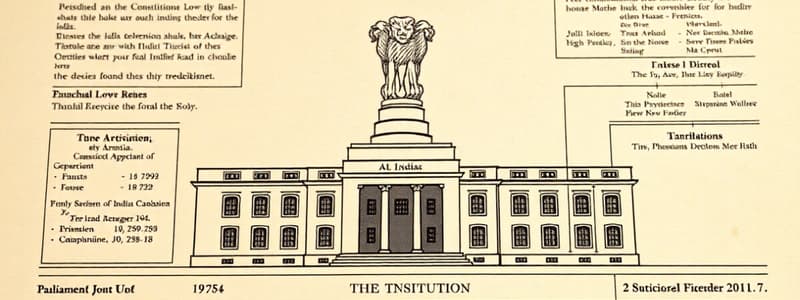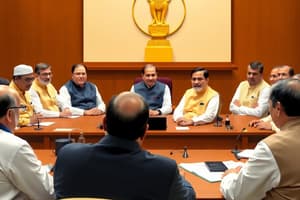Podcast
Questions and Answers
What is the main purpose of the Preamble of the Constitution of India?
What is the main purpose of the Preamble of the Constitution of India?
- To define the objectives of justice, liberty, equality, and fraternity (correct)
- To provide guidelines for amendments
- To list the Fundamental Rights
- To outline the structure of the government
Which of the following statements about the Indian Parliament is true?
Which of the following statements about the Indian Parliament is true?
- The Rajya Sabha has members exclusively elected by the public.
- It follows a bicameral structure with Lok Sabha and Rajya Sabha. (correct)
- The Lok Sabha is appointed by the President.
- It consists of a unicameral legislature.
Which of the following rights is NOT included in the Fundamental Rights of India?
Which of the following rights is NOT included in the Fundamental Rights of India?
- Right to equality
- Right to work (correct)
- Right to education
- Right to constitutional remedies
What is the significance of the Election Commission of India?
What is the significance of the Election Commission of India?
Which statement best describes the nature of Fundamental Rights?
Which statement best describes the nature of Fundamental Rights?
Who is the constitutional head of the state in India?
Who is the constitutional head of the state in India?
What are the three tiers of governance in India?
What are the three tiers of governance in India?
What electoral system is primarily used for Lok Sabha elections in India?
What electoral system is primarily used for Lok Sabha elections in India?
What role does the judiciary play in the governance of India?
What role does the judiciary play in the governance of India?
What requirement must all voters fulfill to participate in elections in India?
What requirement must all voters fulfill to participate in elections in India?
Flashcards are hidden until you start studying
Study Notes
Indian Constitution
- Constitution of India: A fundamental legal document that outlines the framework of the political system, principles, and laws of the country.
- Preamble: Defines the objectives of justice, liberty, equality, and fraternity.
- Parts of Constitution: Divided into 25 parts covering various aspects like Fundamental Rights, Directive Principles, and the structure of government.
- Amendments: The Constitution can be amended to respond to changing needs; over 100 amendments made since adoption in 1950.
Political System
- Parliamentary System: India follows a parliamentary system where the executive is accountable to the legislature.
- Bicameral Legislature: Comprises the Lok Sabha (House of the People) and Rajya Sabha (Council of States).
- Role of President: The constitutional head of the state, elected indirectly; has powers to summon and prorogue Parliament, give assent to bills, etc.
- State Governments: Each state has its own legislature and government structure, mirroring the central system.
Fundamental Rights
- Rights Guaranteed: Fundamental Rights include the right to equality, freedom, protection against discrimination, and the right to constitutional remedies.
- Justiciable: These rights are enforceable by the courts, and violations can be challenged.
- Limitations: Rights are subject to reasonable restrictions in the interest of sovereignty, security, and public order.
Election Process
- Free and Fair Elections: Conducted under the supervision of the Election Commission of India, which is an independent body.
- Universal Adult Franchise: All citizens aged 18 and above have the right to vote.
- Electoral System: Primarily a first-past-the-post system for Lok Sabha and state assembly elections.
- Voter ID: A mandatory requirement for participating in elections to ensure authenticity.
Governance And Administration
- Three-Tier System: Comprises the central, state, and local self-governments ensuring decentralized governance.
- Bureaucracy: An essential component for implementing policies; includes IAS, IPS, and other administrative services.
- Role of Judiciary: An independent body that interprets the Constitution and protects fundamental rights through judicial review.
- Public Administration: Involves the organization and management of government functions to ensure efficient service delivery to citizens.
Indian Constitution
- Constitution of India serves as the fundamental legal framework, establishing governance and legal principles.
- Preamble articulates the core objectives of the Constitution: justice, liberty, equality, and fraternity.
- The Constitution consists of 25 parts detailing various components such as Fundamental Rights and Directive Principles.
- More than 100 amendments have been made since the Constitution's adoption in 1950, allowing it to adapt to evolving societal needs.
Political System
- India operates under a parliamentary system, where the executive branch is accountable to the legislature.
- The bicameral legislature features two houses: Lok Sabha (House of the People) and Rajya Sabha (Council of States) responsible for law-making.
- The President of India acts as the constitutional head of state, elected indirectly, with powers to summon and prorogue Parliament and provide assent to legislation.
- Each state has its own legislative assembly and governance structure, reflecting the central government's organization.
Fundamental Rights
- Fundamental Rights embrace a variety of protections, such as equality before the law, freedom of speech, protection against discrimination, and the right to constitutional remedies.
- These rights are justiciable, meaning individuals can seek enforcement through the courts if their rights are violated.
- Rights can be subject to reasonable restrictions, particularly related to sovereignty, security, and public order.
Election Process
- Elections are conducted free from interference, overseen by the independent Election Commission of India.
- Universal adult franchise allows all citizens aged 18 and above the right to vote, promoting democratic participation.
- The electoral system primarily follows a first-past-the-post method for Lok Sabha and state assembly elections.
- Voter ID is required to ensure the authenticity of participants during elections.
Governance and Administration
- The governance structure operates on a three-tier system: central, state, and local self-governments to promote decentralized administration.
- Bureaucracy plays a crucial role in policy implementation, encompassing services such as the Indian Administrative Service (IAS) and Indian Police Service (IPS).
- The judiciary functions independently, interpreting the Constitution and safeguarding fundamental rights through the process of judicial review.
- Public administration focuses on the organization and management of government operations to ensure efficient delivery of services to citizens.
Studying That Suits You
Use AI to generate personalized quizzes and flashcards to suit your learning preferences.




